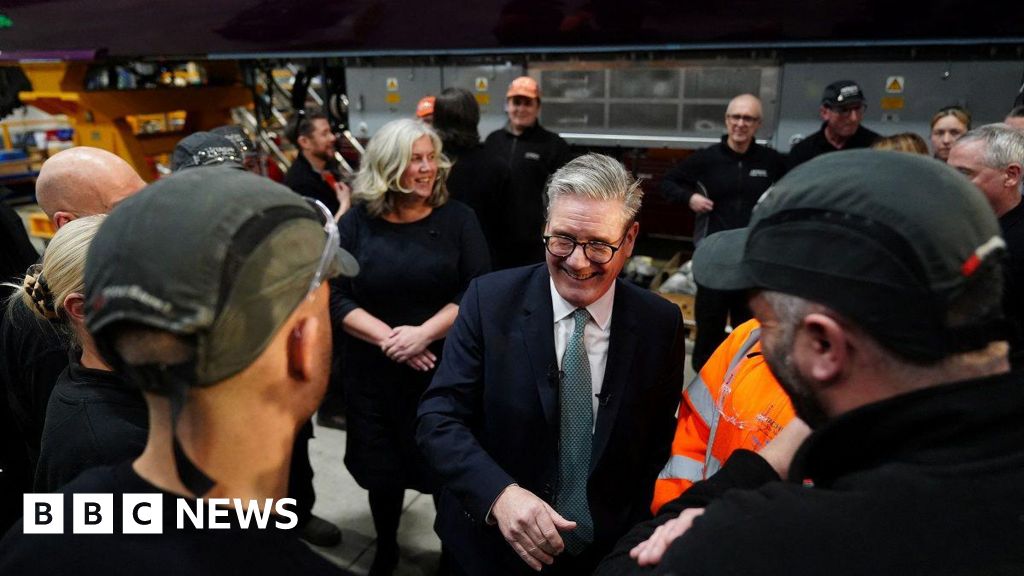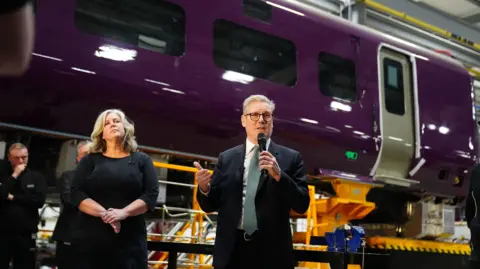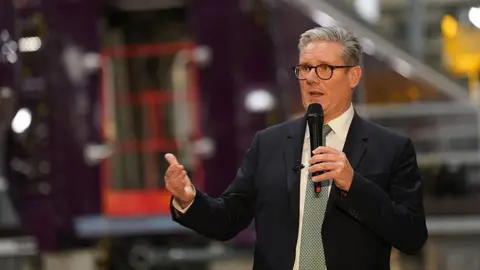Hitachi train factory: Newton Aycliffe jobs ‘protected’ by deal

 Reuters
ReutersHundreds of jobs have been protected at a train factory following a £500m deal, Prime Minister Sir Keir Starmer has said.
A gap in orders at Hitachi’s Newton Aycliffe site, in County Durham, had sparked fears over the future of the site and its roughly 700 employees.
Now the government has announced a contract has been struck to build 14 “state-of-the-art” trains at the factory.
Sir Keir said the deal had given “certainty and stability”.
Speaking to BBC Look North at the factory, the prime minister described its workforce as “world class” and said the deal had eased the worry felt by employees in recent months.
“I stood before them last time I was here and said, if we win the election and form a government, I give you my word we will do everything we can to try to make sure there’s a deal to fill that gap and take away that anxiety,” he said.
“It’s really good for train-building, it’s really good for the country but, on a human level, it’s so important for them, their families, the whole communities here that depend on those jobs.”
Asked what part the government had played in the private sector agreement, he said it had helped “setting the strategy, by being clear about the orders we need, to ensure those deals take place”.
 PA Media
PA MediaThe contract to build the five-car class 80X Hitachi electric or bi-mode trains was agreed between FirstGroup, Hitachi and Angel Trains, with delivery expected to begin in 2027.
Hitachi Rail’s chief director of UK & Ireland, Jim Brewin, described the deal as a “positive step forward”.
It also includes an agreement for FirstGroup to lease a further 13 five-car trains, should its plans to expand its Lumo services be successful.
“We look forward to once again delivering for Hull Trains and Lumo passengers who will benefit further from our award-winning British-built trains,” Mr Brewin said.
FirstGroup CEO Graham Sutherland said the deal would support UK manufacturing and “offer customers more choice as they consider affordable, environmentally friendly modes of travel”.
 PA Media
PA MediaThe chief executive of the Northern Powerhouse Partnership, which represents businesses, told BBC Look North the decision gave Hitachi “welcome breathing space”.
Henri Murison said the previous government “left a mess”.
“There had been huge delays and hiatus because of the way they approached ordering new trains for operators either directly or indirectly under their control,” he said.
“What we’ll now have is a number of train procurements coming forward, I would expect, over the coming months and years that will give Hitachi and other factories across the north of England a fair chance to compete for work.”
North East Mayor Kim McGuinness welcomed the news and said protecting jobs at Hitachi was at the top of a list of priorities she had made when elected.
“Today shows the power of what we can achieve when we stand together, and that our great North East has bright days ahead of us,” she said.
 PA Media
PA MediaMeanwhile, Tees Valley Mayor Ben Houchen described the announcement as something to “celebrate” but warned “we need to make sure the government doesn’t walk away from this now and assume its job is done”.
The Conservative peer said there had been “a real risk” the factory could close in the coming weeks or months.
“The fact it’s secured, at least temporarily, is great news and we’ve got to thank the government for working hard.
“It’s going to give lots of workers and their families comfort over the Christmas period and into 2025.”
But he said the longer-term viability of the factory still had to be considered.
“This isn’t the end of the road.”
Related
A top recruiter says sports marketing roles are hot right…
Jobs are opening up in the sports industry as teams expand and money flows into the industry.Excel Search &
Public employees and the private job market: Where will fired…
Fired federal workers are looking at what their futures hold. One question that's come up: Can they find similar salaries and benefits in the private sector?
Mortgage and refinance rates today, March 8, 2025: Rates fall…
After two days of increases, mortgage rates are back down again today. According to Zillow, the average 30-year fixed rate has decreased by four basis points t
U.S. economy adds jobs as federal layoffs and rising unemployment…
Julia Coronado: I think it's too early to say that the U.S. is heading to a recession. Certainly, we have seen the U.S. just continue t











